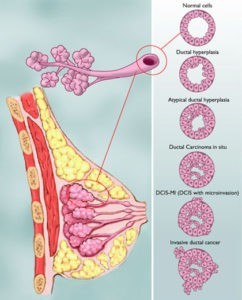
Diagnosed with Cancer? Your two greatest challenges are understanding cancer and understanding possible side effects from chemo and radiation. Knowledge is Power!
Learn about conventional, complementary, and integrative therapies.
Dealing with treatment side effects? Learn about evidence-based therapies to alleviate your symptoms.
Click the orange button to the right to learn more.
- You are here:
- Home »
- Blog »
- side effects ID and prevention »
- Early Breast Cancer- Use Less Chemo- less “over-treatment?”
Early Breast Cancer- Use Less Chemo- less “over-treatment?”

From 2013 to 2015, keeping other factors constant, chemotherapy use (for breast cancer) was estimated to decline from 34.5% to 21.3%.
A diagnosis of cancer is difficult, to say the least. However, an over-treated diagnosis of cancer, including breast cancer adds insult to injury.
What’s the solution to overtreatment for breast cancer patients? I mean, patients can’t be expected to know as much as their oncologist does about a cancer diagnosis and treatment? The solution, according to the study discussed below is to provide more information to both oncologist and patient. The Oncotype DX 21-gene recurrence score has been shown to help oncologists decide whether or not to recommend adjuvant chemotherapy for breast cancer patients.
I am both a cancer survivor and cancer coach. I believe that cancer patients must combine the best of both conventional and evidence-based non-conventional therapies in order to make the best decisions for themselves now and in the future.
Please watch the free webinar linked to the right in order to learn more about the cancer coaching program that I have researched and created based on my living with an “incurable” cancer since 1994.
Thank you,
David Emerson
- Cancer Survivor
- Cancer Coach
- Director PeopleBeatingCancer
Recent Trends in Chemotherapy Use and Oncologists’ Treatment Recommendations for Early-Stage Breast Cancer
“Methods– We surveyed 5080 women (70% response rate) diagnosed with breast cancer between 2013 and 2015 and accrued through two Surveillance, Epidemiology, and End Results registries (Georgia and Los Angeles) about chemotherapy receipt and their oncologists’ chemotherapy recommendations.
We surveyed 504 attending oncologists (60.3% response rate ) about chemotherapy recommendations in node-negative and node-positive case scenarios. We conducted descriptive statistics of chemotherapy use and patients’ report of oncologists’ recommendations and used a generalized linear mixed model of chemotherapy use according to time and clinical factors…
Results- From 2013 to 2015, keeping other factors constant, chemotherapy use was estimated to decline from 34.5% to 21.3%.
Estimated decline in chemotherapy use was from
- 26.6% to 14.1% for node-negative/micrometastasis patients and from
- 81.1% to 64.2% for node-positive patients.
Use of the 21-gene recurrence score (RS) did not change among node-negative/micrometastasis patients, and increasing RS use in node-positive patients accounted for one-third of the chemotherapy decline.
Patients’ report of oncologists’ recommendations for chemotherapy declined from 44.9% to 31.6%, controlling for other factors. Oncologists were much more likely to order RS if patient preferences were discordant with their recommendations, and they adjusted recommendations based on patient preferences and RS results.



